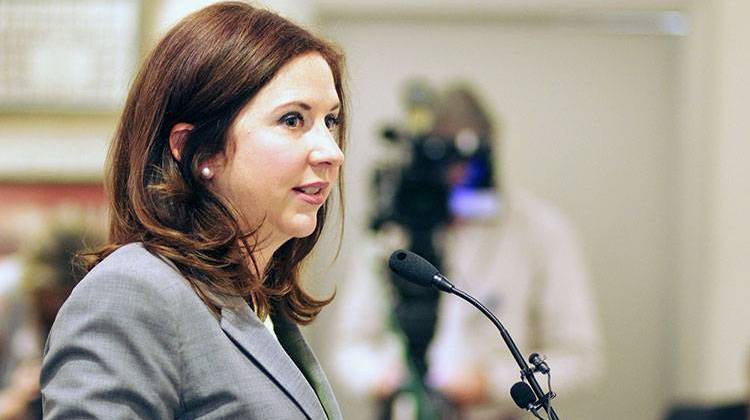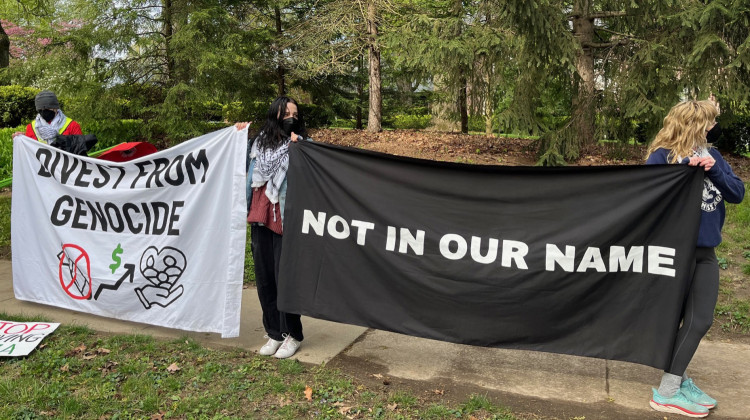Feelings of guilt, societal pressures and fear of police and court involvement keep young sexual assault victims from reporting the crimes, experts told a legislative committee on Thursday.
That means thousands of Indiana girls – and boys as well – go without the treatment they need to deal with the incidents, said Roberta Hibbard, the director of the Child Protection Program at Riley Hospital for Children.
“It is very, very clear that the lack of counseling and mental health support after sexual assault is what causes the most long term problems,” Hibbard told the Criminal Law and Sentencing Policy Study Committee, a bipartisan group of lawmakers, prosecutors and judges.
But lawmakers can’t start to address that problem – and develop better intervention and treatment options – until they gather more data about the breadth of the issue in the state, said John Parrish Sprowl, co-director of the Global Health Communication Center at Indiana University.
He proposed a study that would include two surveys to gather information from physicians, educators, coaches, bus drivers, therapists and others who deal with children. The surveys would measure how the current reporting systems are working and how they could be better. He also suggested a series of focus groups – in rural and urban areas – to gather more detailed information and anecdotes to find out how reporting happens in practice.
The information would give “us an evidence base for what we’re doing, rather than just because we think we know what we’re doing,” Sprowl said. “I and these people have a number of ideas of what interventions could look like but I’d never recommend one until we have the research.”
A recent report from the Centers for Disease Control and Prevention, Indiana leads the nation in reported sexual assaults involving girls. In Indiana, 17.3 percent of girls in grades 9 through 12 said they have been raped, compared to the national average of 10.5 percent of girls in the same age range.
And Rep. Christina Hale, D-Indianapolis, said the findings do not fully reflect the scope of the problem because up to 50 percent of all sexual assaults are never reported.
Hale told the legislative committee Wednesday that the numbers are frightening and unacceptable.
“It’s just not acceptable that our children are in danger of being victims of sexual crime,” Hale said. “What if we decided to do something together and do something about it? We could choose this issue and lead our nation.”
Lawmakers heard from Malea Crosby, a therapist who was the victim of sexual violence as a teenager. She talked about getting into the backseat of a car with a boy who didn’t stop when she screamed and said didn’t want to have sex.
She never reported the assault. And she said adults – including her mother and a physician who should have realized there was a problem – never asked her about it or tried to get her help.
“It was a fear of not being believed,” Crosby said. “There are all these self-doubts and they were confirmed by all the experiences I was having” with adults.
Crosby urged lawmakers to create an atmosphere that encourages discussions about sexual violence in schools, at home and in physicians’ offices.
“Kids need to know there are resources out there to help them,” she said. “I didn’t know that.”
Anita Carpenter, the chief executive officer of the Indiana Coalition Against Sexual Violence, said a 2010 law required the Indiana Department of Education to create a curriculum about sexual violence for schools. But she said there are no teeth in the law to ensure the information is used.
That’s important, Carpenter said, because when students learn the difference between healthy sexual contact and sexual violence, they often report assaults.
“We’ve only been putting a Band-Aid on this problem,” Carpenter said. “In order to fix this problem, we need really good data. We need to understand the magnitude of the problem.”
Sen. Mike Young, the Indianapolis Republican who chairs the Criminal Law and Sentencing Policy Study Committee, asked Hale to develop a proposal for a study that gathers the information needed and bring it back to the group for consideration in December.
Lesley Weidenbener is executive editor of TheStatehouseFile.com, a news website powered by Franklin College journalism students.
 DONATE
DONATE









 View More Programs
View More Programs

 Support WFYI. We can't do it without you.
Support WFYI. We can't do it without you.